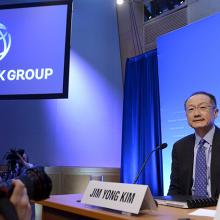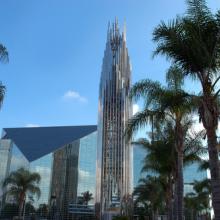Wes Granberg-Michaelson
Ronald J. Sider, founder of Christians for Social Action and a stalwart evangelical advocate for social justice, died of a cardiac arrest on July 27. He was 82 years old.
The World Bank is teaming up with global religious leaders in a 15-year effort to end extreme poverty by 2030.
About 35 religious groups worldwide, including Bread for the World, Islamic Relief International, the Religious Action Center of Reform Judaism, and Sojourners, endorsed the call to action. Supporters include Christians, Jews, Muslims, Baha’is, and others.
“Our approach to this staggering need must be holistic, rooted in the spiritual visions of our respective faiths, and built on a shared recognition of the intrinsic dignity and value of every life on Earth,” the call said.
Observers say it’s the first time the World Bank has tapped the reach and resources of religious groups in combating extreme poverty — partly out of a realization that the work is too big for any one institution, and also in hopes of limiting unnecessary duplication between the World Bank’s ideas and those of various religious groups.
“There’s a real convergence between these dual goals of the bank and many of the commitments and convictions of religious institutions and organizations,” said the Rev. Adam Taylor, a Sojourners and World Vision alum who now oversees faith-based initiatives at the World Bank.
During an April 9 teleconference, Wold Bank President Jim Yong Kim said the number of people living in extreme poverty — living on less than $1.25 per day — has fallen from 2 billion in 1990 to 1 billion today. And he strongly believes that with enough support, that figure could be eliminated in another 15 years.
But Kim said that in order to reach the goal, there will be two important aspects to the fight to end poverty: gathering evidence on what works and what doesn’t work in combating poverty, and enlisting the aid of religious communities.
“I believe that some of the most important leaders in the movement to end extreme poverty will be people of faith, people who are motivated fundamentally to help the most vulnerable among us,” Kim said.
Wesley Granberg-Michaelson’s advice to Christian leaders: Discern God’s call and learn how to sustain your inward life for the long term.
“Leaders have to know who they are,” he said.
“When everything else crumbles and when you are in situations of disillusionment, when plans haven’t worked out, when colleagues have disappointed you, there’ll come those times when you say, ‘Why am I doing this?’
“At that point, what is needed is a deep and abiding sense of God’s call.”
Granberg-Michaelson’s call led him to take on a variety of roles in his career. He served from 1994 to 2010 as general secretary of the Reformed Church in America. He is the author of several books, including “Leadership from Inside Out: Spirituality and Organizational Change.”
Before that, he served as research assistant for U.S. Sen. Mark Hatfield, managing editor of Sojourners magazine, co-founder of a nonprofit organization, and director of church and society for the World Council of Churches.
Q: You’ve had a really interesting career, including working on Capitol Hill and in Geneva, Switzerland with the World Council of Churches. What did you learn from those roles?
Working in the U.S. Senate with Mark Hatfield is when I first learned about how important it was to have a group that had a deep level of trust together. And that you have to work on building that.
And then in the life of Mark Hatfield as a U.S. senator, I saw the importance of giving voice to crucial issues in ways that helped empower others. The role of prophetic ministry I really witnessed in his life in the U.S. Senate, the kinds of stances that he took against the Vietnam War, stances that were rooted in his own convictions.
Those were qualities that came out of his Christian character. But those were also qualities I saw and learned in that secular context.
When I went to Geneva with the World Council, I got to see the enormous complexities of how organizations function and how decisions are made. I was very involved in a restructuring effort.
We spent a lot of time figuring out models for how church bodies can govern themselves. And the World Council was in a deep discussion — conflict, really — with its Orthodox members at that point. I was involved in a special commission on relations with the Orthodox.
One of the key issues was how we make decisions. To the Orthodox mind, it was incomprehensible that a central committee of 150 people could meet together and by a majority vote determine God’s will.
That led to a whole fascinating journey that I’ve continued on ever since, to rethink how church bodies make decisions.
Out of that dialogue came an embracing of models of consensus decision making, which the World Council still uses today, where 150 people will come to a decision that they arrive at by consensus. It’s a discussion, a deliberation that’s led very carefully, very artfully, taking into account the opposing points of view and getting to a point where either the body as a whole agrees or a minority that may not agree are willing to say, “We will step aside and allow this to go forward.” Or convictions are held so strongly that the body as a whole decides it’s really not ready to decide this.
None of these functions by majority vote. It’s a very different model, and I think one that’s much more attuned to how the church could make decisions.
The Supreme Court’s Citizen’s United case infamously affirmed money spent in political campaigns as a form of free speech, thus declaring various legal limitations unconstitutional. The ruling gives a political megaphone to those with the most money and has been decried by many as contributing further to the nation’s political dysfunction and rigid polarization. I strongly agree.
But this ruling came to mind again when I heard the news that the World Council of Churches, at its Central Committee meeting in early July, had made a decision not to invest in fossil fuel industries. In fact, money does talk. Where institutions place their invested funds is not a neutral, pragmatic matter. It speaks volumes.
A global leader in ecumenical movement has alerted participants to the forthcoming World Council of Churches 10th Assembly in Busan, to be aware that they meet in rapidly changing times for world Christianity.
He says there are consequences for all church institutions, including the WCC itself.
Rev. Wesley Granberg-Michaelson, in a book timed to coincide with the gathering, says so fundamental are the changes now shaping the Christian world that the WCC will need to "commit to deep change."
It they don't, he says, they could remain largely isolated from the dynamic and growing parts of the church, especially from the global South.
His perceptions are likely to strike a chord at when the World Council of Churches meets in Busan from Oct.30 to Nov. 8 for its 10th Assembly, the highest decision making body of the grouping that represents some 560 million Christians.
Granberg-Michaelson, is a former member of the main governing body of the WCC, its central committee, and worked on the staff of the organization for six years, originally as director of the Church and Society programme.
He says the book, From Times Square to Timbuktu, is an attempt to describe the "growing gulf" occurring in world Christianity, primarily between the burgeoning Pentecostal and evangelical churches in the global South and the declining churches of the global North.
Last Sunday, Pastor Sheila Schuller Coleman appeared for apparently the last time before some 800 people at the morning service of the Crystal Cathedral in Garden Grove, Calif.
For members of the extended Schuller family who had built and shepherded the iconic megachurch into the spiritual home for 10,000 members, so much had changed:
- Faced with staggering debts and a bankruptcy filing, the glass building was recently sold to the local Catholic diocese, but can remain Protestant in the short term.
- The staff had dropped from 350 to 200, including the recent firings of Coleman's sister, husband and brother-in-law, who had all worked on its "Hour of Power" broadcasts.
- Just the day before, her parents, Robert H. and Arvella Schuller, had departed the ministry they started more than 50 years ago, citing a multimillion-dollar fight with its board.
As members of the Schuller family head in new directions — Coleman and brother-in law Jim Penner plan to start a new church this Sunday — the famous glass-walled church offers a cautionary tale of the potential pitfalls facing family-run ministries.





